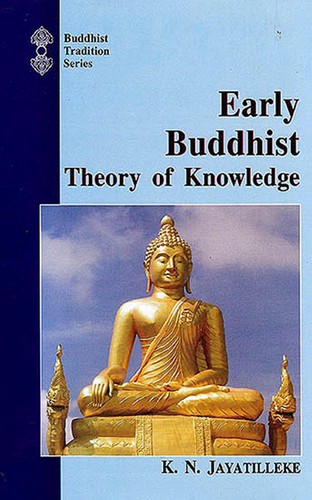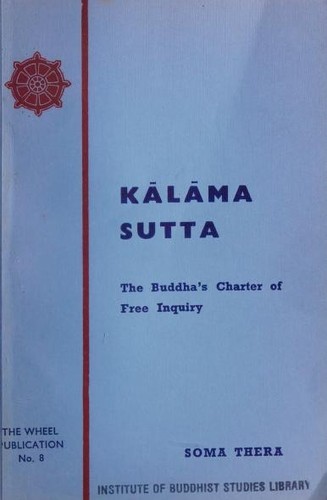Pramāṇa
Subscribe to this topic via: RSS
Epistemology is the study of the nature of truth and what we—with our limited faculties and understanding—might do to come to know truth.

This 19th c woodblock by Hanabusa Itchō depicts the famous parable from Ud 6.4 where the Buddha compared the various religious sectarians to blind men attempting to describe an elephant. Compared to a Buddha who sees, we are each only able to partially grasp the truth.
Table of Contents
Books (8)
Featured:
See also:
Canonical Works (25)
Featured:
-
The Buddha gives an account of his struggles for—and achievement of—awakening in answer to a question about how he knows and teaches what he does.
-
A challenging discourse (even for those who first heard it!), this first sutta of the Majjhima Nikāya is a forceful rejection of all forms of monism, and the Samkhya philosophy in particular.
5 pages -
⭐ Recommended
What if I were to dwell in dependence on this very Dhamma to which I have fully awakened, honoring & respecting it?
-
… whatever is seen, heard, sensed, cognized, reached, sought after, examined by the mind—that I know.
-
Sensual search, the search for being,
The search for a holy life … -
The fleshly eye, the divine eye, and the wisdom eye. These, bhikkhus, are the three eyes.
-
If anyone, bhikkhus, should speak thus: ‘Having rejected this all, I shall make known another all’—that would be a mere empty boast on his part.
See also:
Readings (33)
Featured:
-
⭐ Recommended
Drawing upon the Yogācārin model, Dharmakīrti explains that the contemplative must first grasp the objects through cognition born of listening, ascertain them through reflection based on reasoning, and finally cognise them through meditative cultivation. This leads to valid perception.
-
⭐ Recommended
… a fair number of occurrences in the Buddha’s life would be difficult to explain if he had been omniscient
-
In this paper, Bhikkhu Dhammadinā thoroughly explores an early Buddhist view of epistemology, one based on the four noble truths yet grounded in personal liberative experience, exploring contact (phassa/sparśa), the experiential domain (āyatana), and the validity of first-person experience.
-
thinkers developed the notion of a ‘concept’ in order to explain how it is that words are capable of applying to real objects, and how concepts can be used to capture elements of word meaning extending beyond reference to real objects. In particular, I will focus on the developments made by Phywa pa Chos kyi seṅ ge in the middle of the twelfth century, as well as on reactions to those developments by Sa skya Paṇḍita
-
A major focus of the Brahmajala Sutta (DN 1) is the discussion of 62 false views (ditthi). This article attempts to uncover an epistemological standpoint from which these views are seen to be false.
-
The 6th-century Buddhist philosopher Dharmakīrti differs from Mādhyamika philosophers but shares some interesting aspects with the Stoics.
-
This article presents a different take on the Kālāma Sutta, suggesting that it is about faith in the teacher and transformative practice, over the more common interpretation that the sutta is an early text on “free inquiry.”
-
For Early Buddhism, “public knowledge” would be a contradiction in terms.
-
Both viññāṇa and paññā can be interpreted to mean consciousness, the former the consciousness apropos of the phenomenal and the latter apropos of the noumenal.
-
A response to the Buddhist Modernists (especially Jayatilleke) who claim that Dependent Origination is “scientific” explaining that the salvific goal of Buddhism makes its epistemology necessarily different from the descriptions of science.
-
Madhyamaka is thus conceived of as a means, with liberation as its ultimate end. But the question remains, how does philosophical argumentation lead to spiritual goals?
-
True confidence only comes about once the teachings have led the disciple to personal verification of their efficacy.
12 pages -
The more convincing position taken in Sarvāstivāda exegesis sees the three types of wisdom as interrelated activities that can rely on mindfulness, thereby testifying to the flexibility and broad compass of mindfulness in Buddhist thought as something not limited to a rigid division between theory and practice.
-
The post-modern epistemic absolute is based on the belief that knowledge is intrinsically tied to identity. And consequently this belief embraces positionality and standpoint theories as valid theoretical and practical foundations for personal and communal education, or cultivation. These beliefs come to percolate contemporary Buddhist discourse more and more.
-
So there’s a tension in the Buddha’s recommendations about faith and empiricism. Few of Asian Buddhists I know find the tension uncomfortable, but Western Buddhists — raised in a culture where religion and faith have long been at war with science and empiricism — find it very disconcerting.
-
… whatever (is) seen, heard, or thought, the good say ‘putting down’
-
… any theory which goes beyond the data of sensory experience could lead to a lot of unnecessary speculation and diatribes resulting in vexation.
-
Leave behind the analogies of foolish minds and modes of speech,
And look instead into the mind for which there can be no analogy. -
A brief summary of the term vohāra, common speech, and in particular its role in Buddhist views of language.
See also:
Audio/Video (7)
Featured:
-
This is a five-part lecture series briefly introducing Jayatilake’s Early Buddhist Theory of Knowledge.
-
In this interview, Daniel Aitken and Charles Hallisey speak with Bhikkhu Analayo about early Buddhist ideas of rebirth and Analayo’s book on the topic.
See also:


